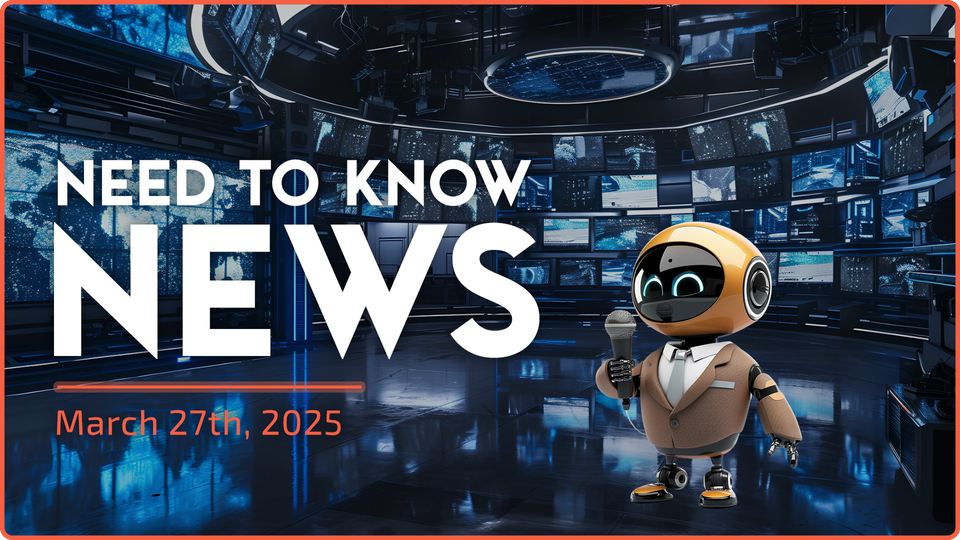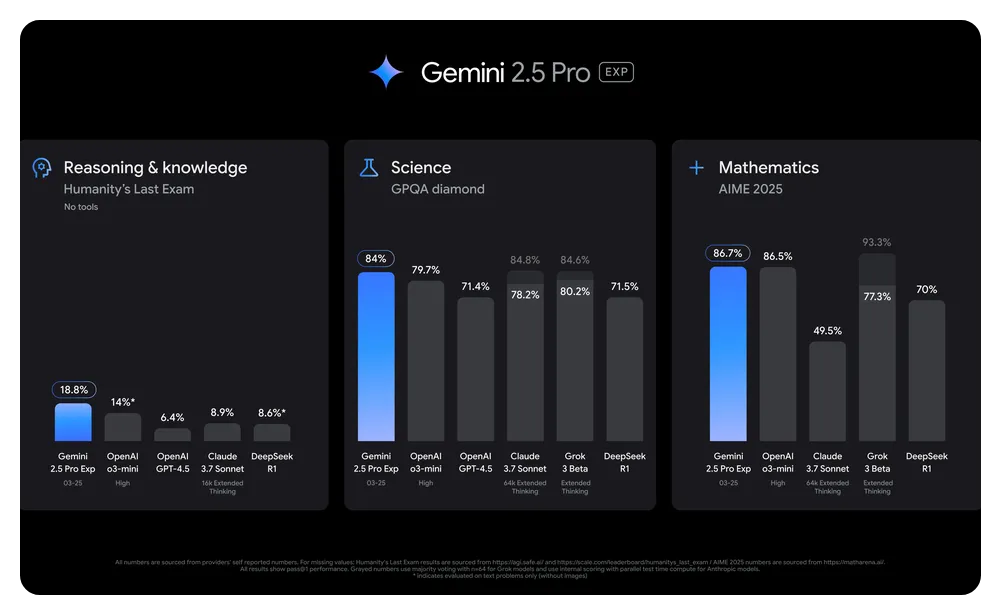Need to Know News - March 27th, 2025

In this week's Need to Know News edition:
🤖 OpenAI's new image generation has users going wild — why is everyone suddenly obsessed with Ghibli-style animation?...
🤖 Google's new "thinking model" just topped the charts — the surprising capability that has competitors scrambling to catch up...
🤖 The $30 AI experiment that's making billion-dollar tech giants nervous about their massive investments...
And whole lot more!
OpenAI Integrates Advanced Image Generation Directly Into GPT-4o
OpenAI has built image generation directly into GPT-4o, making AI pictures more useful than just pretty . Unlike rivals that struggle with complex requests, GPT-4o handles up to 20 objects with clear text.

You can improve images through simple chat while keeping details consistent across versions. The system follows exact instructions and uses its knowledge when creating visuals.
Safety features include special metadata to show an image came from AI. The tool is now available to Plus, Pro, Team and Free users, with developer access coming soon.
ChatGPT's New AI Image Generator Overloaded with Ghibli Style Image Requests
A new trend of creating Studio Ghibli-style images has exploded on social media, overwhelming OpenAI's servers. Users are transforming photos of celebrities, historical moments, and memes into colorful anime-style pictures that mimic the famous Japanese animation studio's look.

The feature uses GPT-4o's new built-in image generation and works by uploading any image and asking it to render it "in the style of Studio Ghibli". The huge demand from paying users has forced OpenAI to delay rolling out the feature to free users.
🚀 Discover the 27 ‘Plug-and-Play’ AI Prompts Every Marketer Needs
>>Access All 27 Prompts Here<<
Amazon Tests AI Helpers for Shopping and Health as Part of 1,000-App Push
Amazon is testing two new AI tools to keep shoppers in its ecosystem. "Interests AI" lets you search with natural language like "brain teasers that are not too hard, made out of wood" instead of rigid keywords.
The company also launched "Health AI." It's their chatbot that answers wellness questions, suggests products, and includes "clinically verified" info from licensed doctors.
Both tools are part of Amazon's massive AI push. CEO Andy Jassy says teams are building about 1,000 AI apps across the company. The timing is perfect - shoppers are using AI more when buying things. Amazon clearly wants customers using its AI helpers instead of ChatGPT when shopping or looking for health advice.
Voice-Controlled AI Workout Buddy Helps Echelon Users Stay Fit Anywhere
Echelon just launched a voice-controlled AI assistant that lets you change your workout plans by simply talking to it. The new system creates custom 2-week fitness plans based on your history, then adapts when you tell it to swap workouts or adjust for travel. Early tests show this personalization could boost customer retention by 7%.

Unlike most fitness AI, you can have actual conversations with this assistant. Echelon co-founder John Santo says the system only added 5% to costs since it's designed smartly. The AI even suggests workout buddies by noticing when users take the same classes. As Santo puts it: "Discouragement is the thing that kills fitness" - and this AI aims to solve that.
Google Launches Gemini 2.5: "Thinking" AI That Tops the Charts in Reasoning Tests
Google just released its smartest AI yet - Gemini 2.5. This new "thinking model" can reason through problems before answering, making it more accurate. It sits at #1 on the LMArena leaderboard by a wide margin.

The first version, Gemini 2.5 Pro Experimental, beats other AI in math, science, and coding tasks. It handles up to 1 million tokens of information at once (with 2 million coming soon). This means it can work with huge amounts of text, images, audio, and code.
Gemini Advanced users can try it now. Google will add pricing soon for business use. The key breakthrough is how it "thinks" about complex problems just like humans do.
Meta's AI Buddies Are Taking Over Your Social Apps - And Nobody's Talking About It
Meta is quietly adding AI bots to all its apps. Facebook, Instagram, Messenger, and WhatsApp now let you chat with AI characters or even create your own with custom personalities and voices.

These aren't just chat features. Meta plans to add "millions of AI characters" with real-looking profiles that post and comment like humans. Many users won't know they're talking to bots.
We already know social media can harm mental health, especially for teens. Now people might form relationships with fake profiles. But Meta keeps pushing ahead because more engagement means more ad money.
Tiny AI Models Challenge Big Tech's Billion-Dollar Spending
When Chinese company DeepSeek built an AI model for just $6 million (while OpenAI spends billions), it started a mini-revolution. Now small teams are doing even more with less. UC Berkeley students created a "thinking" AI for only $30 by renting two special computer chips.
Their "TinyZero" model learned to play a simple math game and started to think before answering - just like the expensive AIs do. This shows that AI doesn't need to be huge to be smart. As one expert put it, this changes what we thought about AI - you don't need massive size for an AI to learn and fix its mistakes. Small, focused models might be the future.

Microsoft Adds Deep Research Brainpower to Copilot with "Researcher" and "Analyst" Tools
Microsoft is adding two new AI research tools to its Copilot chatbot. "Researcher" uses OpenAI's deep research model to help with big projects like market strategies and reports. "Analyst" uses a special reasoning model to solve data problems step-by-step and can even run Python code.

What makes these tools special is they can tap into both work apps and the internet. They connect to tools like Salesforce and Confluence to find company data. The challenge is making sure they don't make stuff up. Microsoft 365 Copilot customers can try these new tools starting in April through a program called Frontier.
Texas School's AI Tutors Push Students to Top 2% Nationwide
Austin's Alpha School is changing how kids learn with AI tutors. Students spend just two hours a day with the AI assistant and still score in the top 2% nationally. The rest of their day focuses on real-world skills like public speaking and teamwork.
Junior student Elle Kristine loves the system. While her friends at regular schools are "stressed out" with homework, she finishes all academics in three hours and spends the rest working on her passion project - an AI dating coach for teens.
School founder Mackenzie Price says this setup lets teachers focus more on emotional support than just teaching facts. The model is now expanding across the US.
Workers Using AI More But Training Falls Behind, Survey Finds
AI use at work has jumped from just 8% to 35% of workers in two years, but most feel unprepared. A new Jobs for the Future survey shows that while more than half of workers feel AI impacts their jobs, only 31% get any training from employers.
Most people are teaching themselves - 60% use AI for self-learning and 20% use it at work on their own, not because bosses asked. And it's changing career plans too, with 19% of workers already using AI to get better jobs.
Thanks for reading.
Until next time!
The AI Marketers
P.S. Help shape the future of this newsletter – take a short 2-minute survey so we can deliver even better AI marketing insights, prompts, and tools.
[Take Survey Here]

